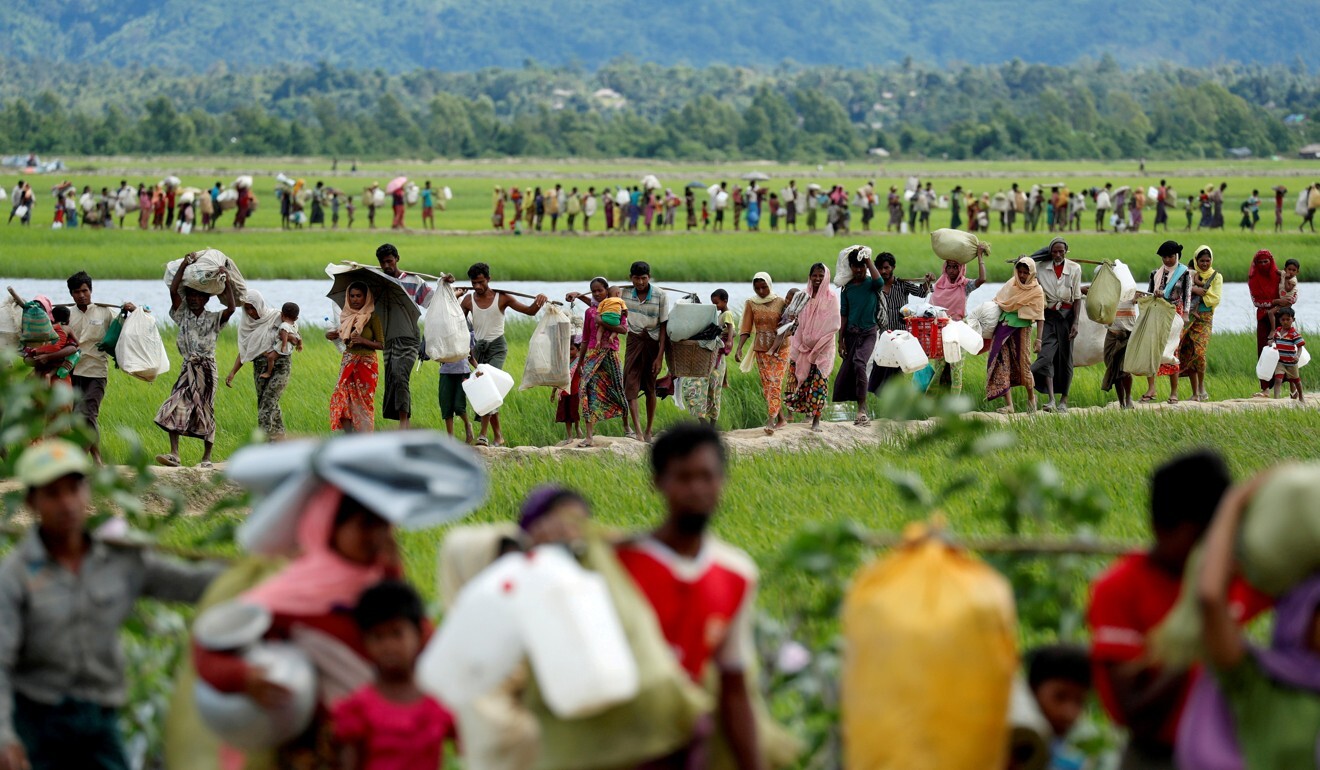
Myanmar: Australian adviser to Aung San Suu Kyi in court; thousands flee town after clashes
- Macquarie University professor Sean Turnell was the first foreigner arrested after the February 1 coup, on immigration and official secrets charges
- Meanwhile, thousands of residents have fled a town in west Myanmar after days of fighting between anti-junta dissidents and the military
Macquarie University professor Sean Turnell was the first foreign national arrested following the February 1 coup that ousted Suu Kyi’s government and sparked huge protests.
Turnell has been held at Insein Prison in Yangon since his arrest and appeared “frail and tired” in court in the capital Naypyidaw, said lawyer Khin Maung Zaw, who is working on the case.
Turnell was wearing a “full Covid-19 protective outfit”, the lawyer added, without giving precise details.
In July his wife pleaded for his release, citing worries about his health as the country endured a surge of Covid-19 cases. Pictures of Turnell allegedly receiving a vaccine in Insein Prison later appeared in state-run media.
China secretly sending Covid-19 aid, Myanmar rebel groups say
Myanmar has been in turmoil since the military coup, which sparked a mass uprising and a brutal crackdown on dissent.
Suu Kyi is on trial for a raft of offences, including illegally importing walkie-talkies, flouting coronavirus rules and incitement. She faces decades in prison if found guilty.
Her National League for Democracy government was deposed by the military for alleged voter fraud during 2020 polls, in which it trounced a political party aligned with the generals.
Security forces have killed more than 1,100 civilians since the coup, according to a local monitoring group. The military says the toll is much lower.

Clashes
Meanwhile, thousands have fled a town in west Myanmar after days of fighting between anti-junta dissidents and the military, during which soldiers bombed civilian homes, residents and media said.
Attacks on junta troops have increased after lawmakers ousted by the generals called for a “people’s defensive war” earlier this month.
Soldiers fought battle with around 100 members of a local defence group after being “ambushed” in Thantlang in remote Chin state near the India border on September 18, junta spokesman Zaw Min Thun said. He did not give casualty figures.
Alarm over call for ‘defensive war’ against Myanmar junta, as youth back revolt
Residents began to flee on Monday after soldiers “began to randomly shoot out the windows” of houses in the town, according to one local who did not want to be named.
“Almost everyone has left,” he said, adding he was sheltering in a nearby village with around 500 people, and that several hundred had already headed towards India.
Thantlang has a population of around 7,500, according to the most recent census.
Another resident said she travelled for three days with her elderly parents to reach India after soldiers bombed her house and fighting escalated around the town. “I never thought of running from my own house even after the military bombed it … but as things got worse … I finally had to flee,” she said on condition of anonymity.
Residents across the border in India’s Mizoram state said about 2,000 extra refugees have arrived from Chin state since September 10. Some said they had seen military planes dropping bombs on targets in Chin.
One inhabitant of Thingsai village said through a translator that on September 10 villagers heard gunfire and bombings across the border. Another said villagers saw the military planes dropping bombs.
One refugee who had crossed over on September 15 said he rode a bike for three days to get to Mizoram. “We are very scared after the bombing. We had to flee. Two of my children stayed back to fight the military and protect our people,” the man said, declining to be named.
Videos and pictures published by media showed buildings in Thantlang they said had been destroyed by the military, and domestic animals roaming deserted streets.
Myanmar anti-coup group bombs military convoy, killing at least 2
Military spokesman Zaw Min Thun said 20 homes and a government building had been destroyed in a fire after the September 18 clash, without specifying a cause.
In recent weeks anti-junta fighters have attacked communications towers belonging to the military-owned Mytel across the country, including in Chin state.
The UN warned renewed fighting in the region was sending more people fleeing into India, where they urgently required food and shelter.
In May, government forces used artillery to flush out rebels from the town of Mindat in southern Chin state, and later cut off its water supply, according to a spokesman for a local insurgent group.

Facebook records
The judge in Washington on Wednesday criticised Facebook for failing to hand over information to investigators seeking to prosecute the country for international crimes against the Muslim minority Rohingya, according to a copy of the ruling.
Facebook had refused to release the data, saying it would violate a US law barring electronic communication services from disclosing users’ communications.
Wirathu, the Myanmar monk labelled ‘the face of Buddhist terror’, released
But the judge said the posts, which were deleted, would not be covered under the law and not sharing the content would “compound the tragedy that has befallen the Rohingya”.
“Facebook taking up the mantle of privacy rights is rich with irony. News sites have entire sections dedicated to Facebook’s sordid history of privacy scandals,” he wrote.
A spokesperson for Facebook said the company was reviewing the decision and that it had already made “voluntary, lawful disclosures” to another UN body, the Independent Investigative Mechanism for Myanmar.
More than 730,000 Rohingya Muslims fled Myanmar’s Rakhine state in August 2017 after a military crackdown that refugees said including mass killings and rape. Rights groups documented killings of civilians and burning of villages.
Additional reporting by Reuters

.png?itok=arIb17P0)